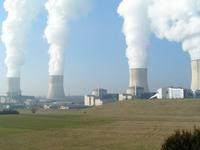 place a nuclear power station at RAF Leeming, if the MOD decides it will place the new F-35 joint combat aircraft elsewhere?
place a nuclear power station at RAF Leeming, if the MOD decides it will place the new F-35 joint combat aircraft elsewhere?Global Warming:
A Pentagon report commissioned in 2003 suggested that global warming, not terrorism, is the greatest threat to civil life(1). The Pentagon official who commissioned the study, Andrew Marshall, issued a brief statement saying it “reflects the limits of scientific models and information when it comes to predicting the effects of abrupt global warming. ... Much of what this study predicts is still speculation.”(2)
However, its worst case scenario said it was plausible that levees in the US (in Sacramento) and Holland would be broken in 2007. In the light of recent events, this may appear overly optimistic.
This report was echoed by Sir David King, the UK's Chief Scientific Adviser, warning that “without immediate action flooding, drought, hunger and debilitating diseases such as malaria would hit millions of people around the world." As example of local impacts, he pointed to increased usage of the Thames Barrier, “…You'll see that instead of using it once every three to five years, we're now using it on average six times a year and the usage anyone can see is climbing upwards.”(3)
The suggestion is that impacts could abruptly accelerate even if carbon emissions are reduced. Due to increasing Arctic meltdown, fresh water entering the Atlantic could slow down or stop the Gulf Stream. In turn this could lead to temperate Europe experiencing Siberian temperatures within decades.
Hurricane Damage:
Although disputed(4), recent increased strength hurricanes were blamed on Atlantic warming(5). Damage to oil extraction and refinement in the Gulf of Mexico and the surge in crude price hit the world’s poorest countries hardest. Fuel price rises coupled with reduction of subsidies sparked fuel riots as far away as Indonesia(6). Nigeria was forced by continued demonstrations to suspend its policy of reducing subsidies and promise that cost of gasoline would not increase further until the end of 2006(7). Richer countries have not escaped, principally the US. 26 IEA member countries agreed to release reserves to prevent US fuel shortages(8). Will this be repeated next year?
Energy Security:
In the long term, the IEA projects that by 2030, without new energy policies, oil demand will rise 50% and gas by 100%, “with most of the easy, low cost hydrocarbons in the Middle East.” The major concentrations located in Iraq, Iran and the ultimate prize, Saudi Arabia. Leaving aside what the rise in demand will do to global warming, some experts suggest that the ability to extract enough oil to meet demand is reaching its peak.
Long term projections are controversial because of secrecy over oil reserves by producing countries. The IEA predicts a peaking in world production in 2050, with all non-OPEC production, currently 60% of world production, peaking by 2010(9). The French government predicts a world peak in 2013(10).
Closer still, “OPEC is pumping at full capacity; prices will continue to rise, because oil is running out,
we are at the doors of a great energy crisis” says the Venezuelan President, Hugo Chavez(11) .
The G20 group of countries predict long term instability and vowed to promote energy saving, alternative energy and reduce
 oil subsidies(12). Oil multinationals, who presumably know which way the wind blows, rebrand themselves as keen supporters of renewables. BP for example, is now "Beyond Petroleum".
oil subsidies(12). Oil multinationals, who presumably know which way the wind blows, rebrand themselves as keen supporters of renewables. BP for example, is now "Beyond Petroleum".National and Local Impacts:
In the short term, local bus fare rises were blamed on hurricane Katrina(13). Petrol wholesalers predict £1 a litre and beyond in coming months(14). Increased gas and electricity prices are blamed on the peaking of North Sea production and vulnerability to increased wholesale rises of imported fuel from producers such as Russia, Iran and Algeria(15).
The Met Office suggests the coming winter could be one of the coldest for ten years(16). If so, coupled with higher fuel prices, hypothermia deaths rates may rise. For business, the CBI warns that, low national fuel reserves coupled with a long cold winter could lead to hundred of thousands of layoffs. (17) Domestic heating is supposed to take priority in the event of shortages.
However, “....a shortfall of over 10% would be catastrophic. The bulk of demand destruction must come from CCGTs since domestic customers can’t have their supply regulated on a day-by-day basis so a gas shortage manifests itself as an electricity shortage. Commercial customers lose gas, domestic customers lose electricity.”(18)
Resource War, Terrorism and Civil liberties:
Is this global warming-peak oil scenario alarmist? Does it provide clues to the reasoning behind the US/UK governments' aggressive foreign and domestic policy? For example, the brutal invasions of “Pipeline-istan” (19) and Iraq, the current attempts to undermine Iran’s rapidly increasing role in the reconstruction of Iraq? (20) Bush’s demand (in 2002) for fingerprinting/data retention for all E.U. citizens? (21) Is the incessant drumbeat of terrorism, as the principle threat to civil life, a smokescreen to further restrict liberties - applicable as public opposition to future resource wars, along with fuel, food price rises, spark civil unrest?
The Bush/Bliar plan to steal control of Middle Eastern resources is stalled as Iraqi oil output falls to1980’s levels through regular pipeline attacks (22). This was the invasion that was supposed to pay for itself. Iranian-Iraqi economic and structural integration cooperation spins out of US/UK control. (23) (see iraqieconomy.org). Blair holds his hand out to Putin for increased fuel supplies and talks up nuclear power(24). To be fair, leading environmental scientist, James “the prospects look
 grim” Lovelock, has also promoted nuclear investment as a quick fix to mitigate against the worst impacts of global warming(25).
grim” Lovelock, has also promoted nuclear investment as a quick fix to mitigate against the worst impacts of global warming(25).Locally, government wind farm/ sustainability targets suggest an “excessive concentration on Hambleton” according to local energy watcher, Mr. Mike O’Carroll, REVOLT(26). (www.revolt.co.uk, Newsletter 188). Is a continued total dependence on the grid energy, the most sensible response to local need? How does micro-generation fit into local strategic planning?
Referring to a sustainable housing project in Nottingham, Professor Peter Smith, former Vice President of Sustainable Development at the Royal Institute of Architects suggests that housing, “far from being part of the problem, can be part of the solution.....millions of homes could, if conditions were right, become micro-power stations through the use of photo voltaics and small scale wind.” (27)
Is this vision of energy independence overly optimistic? What feasibility studies have been conducted for North Yorkshire? (28)
Is continued total dependence on the grid energy, wherever it is sited, the most sensible and only response to global warming/local need? As energy costs put further pressure on pockets of slow learners like myself, I suspect many will be asking the similar questions.
Currently, Hambleton D.C. is asking for residents’ views on 400 plus sites suggested for future developments at exhibitions and meetings. It will be interesting to see how energy security fits in with the Local Development Framework. (29)
References:
1. Global Business Network, February, 2004.
2. MSNBC News, February, 2004, “Storm over Pentagon climate scenario”.
3. Greenpeace Business Lecture, 20th, October, 2004.
4. Tech Central Station, 16 September, 2005, “Global Warming and Hurricanes: Still No Connection”.
5. Nature Online Magazine, July 31st, 2005, “Increasing destructiveness of tropical cyclones over
the past 30 years”.
6. Washington Post, October 3rd, 2005, “High Oil Prices Met With Anger Worldwide”.
7. BBC News, 9th September, 2005, “Nigerian March against fuel hikes”
8. Reuters.com, 2nd September, 2005,
9. Energy Bulletin, 20th September, 2005, “IEA:Non-OPEC oil production to decline after 2010”
Non-OPEC countries include such large producers as Russia, China, the US, Mexico, Kazakhstan,
Azerbaijan and Norway.
10. BBC News, 10th June, 2005. “Peak oil enters mainstream debate”.
11. & 12, AME Info, Middle East Business Resource, 16th & 17 October, 2005.
13. The Northern Echo, October 6th, 2005. “Oil prices blamed as bus fares rise”.
14. The Independent, October 18th, 2005. “Rising fuel prices push up inflation”.
15. Prospect Union News, 12th September, 2005. “Predicted big chill threatens winter blackouts “
16. The Met Office, Winter forecast 2005/6 (Dec/Jan/Feb).
17. The Scotsman, 24th October, 2005, “Britain set to run out of fuel warns CBI boss.”
18. Energy Bulletin, August 28th, 2005, “UK gas and electricity crisis looming”.
CCGTs are combined-cycle gas turbines which use both gas and steam turbine cycles in a
single plant to produce electricity with high conversion efficiencies and low emissions.
29. Copies of the Local Development Framework & Local Agenda 21 - Sustainable Development are obtainable from www.hambleton.gov.uk/hambleton/environment.nsf/pages/environment.html

No comments:
Post a Comment